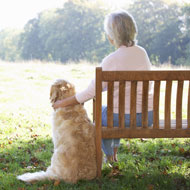Cash boost for Dementia Dogs Project

More than 500 people living with dementia are set to benefit from the Dog Days.
A series of community events and trials using trained therapy dogs can now go ahead, thanks to funding from the National Lottery.
UK charity Dogs for Good received a grant of £314,022 for the Dementia Dog Project that the charity runs in partnership with Alzheimer Scotland.
The money will be used to pilot a series of ‘Dog Day’ community events and goal-oriented therapy intervention pilots in Scotland and England.
“This grant will allow the Dementia Dog Project team to test and pioneer new approaches to reduce social isolation and bring joy and meaning into the lives of people with dementia,” explained Peter Gorbing, chief executive of Dogs for Good.
“Through our work training dementia assistance dogs, we have seen the positive contribution that dogs can make to people’s lives. This boost in funding for the Dementia Dog project will help us to reach even more people living with dementia in the community.”
More than 500 people living with dementia are set to benefit from the Dog Days, with evaluation measuring well-being and economic benefits for both people with dementia and their carers.
Community dogs, supplied by Dogs for Good, will undergo their advance training at HMP Castle Huntly - an open prison near Dundee and the operational base for the Dementia Dogs Project. Men at the prison gain valuable employability skills and improve their well-being while helping to provide highly trained dogs to help people living with dementia.
In the community, pools of volunteers and their pet dogs will also be recruited and trained in trial areas, to help establish new training standards. They will also test the viability of delivery mechanisms on a larger future scale.
“This pilot project from Dogs for Good is an excellent example of how National Lottery funding can help groups test out new ideas or approaches,” said Maureen McGinn, chair of Big Lottery Fund, Scotland.
“There is evidence which shows that dementia assistance dogs can help people with dementia and their families live more fulfilling independent lives. So we are delighted to be able to fund some of this work in Scotland.”



 The RCVS has announced a new version of its 1CPD mobile app, with enhanced features for veterinary surgeons and veterinary nurses to record their continuing professional development.
The RCVS has announced a new version of its 1CPD mobile app, with enhanced features for veterinary surgeons and veterinary nurses to record their continuing professional development.